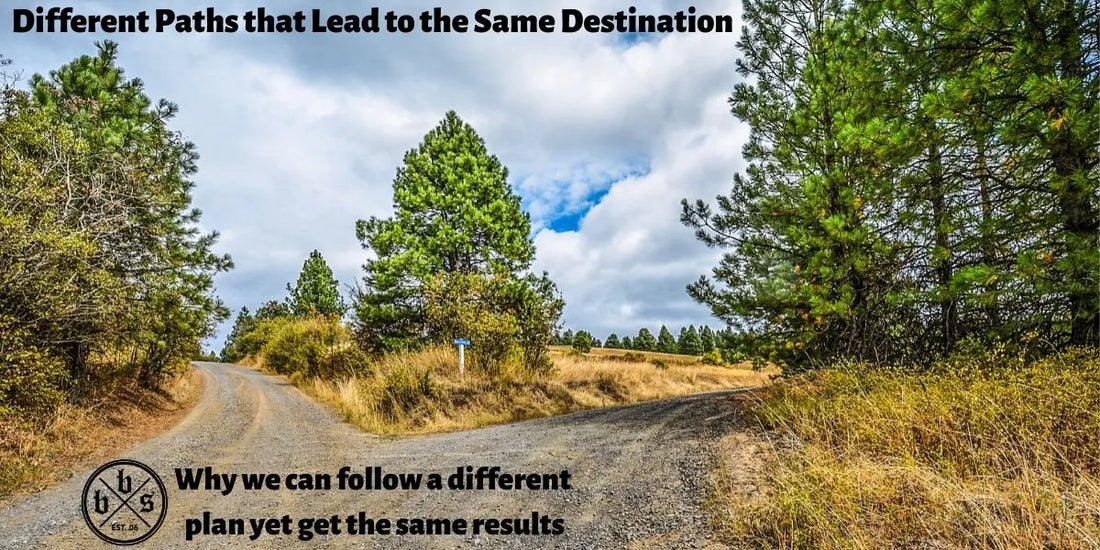
Different Paths but Same Destination: What Gives?
Share
She stopped doing “this” and 4-weeks later had lost fat, built muscle, and felt better! I bet you know someone like this. Perhaps that someone is you. Quick transitions into improved health and fitness flood our inbox, social media pages, and in-person conversations. That all sounds great, except, many of these images contradict one another.
I’m So Confused!
One friend stopped eating meat and within weeks lost 15lbs. Another friend started eating meat again and within weeks lost 15lbs. An easy answer to this riddle is that certain things work for certain people. This is partially true, however, it is less true than people assume. There must be a better answer as to why doing the opposite of someone else can yield similar results.
When Most of the Benefits Occur
Ever hear someone say they stopped eating meat 2-years ago and because of that choice, last month continued to lose weight? I’ve never heard this and I bet you haven’t as well. But I’m not just picking on vegetarians here, the same is true for those who eat meat.
Here is the main reason why opposing paths get to a similar destination. It is the change itself that continues the progress. It might be modified calories, a different strength training program, or perhaps more sleep. What it will not be, is the same change, repeated.
Science Isn’t as Helpful as We’d Hope
Researchers do not make things better. The majority of studies are done on 4,8, or 12 week periods of time. The main reason for this is funding. It is easier to raise money to run a 12-week study than it is to run a 12-year study. Even the latest studies continue to confuse people. What is worse is how we market these studies.
When Emotions Run High
Documentaries are produced which state draw an hour worth of emotions based on these short-term studies, compounding the problem. Two documentaries will come out at the same time, with opposing research, battling to be right. Unfortunately, they are both wrong…
Look For the Link
Crucial is that in all of these arguments we look for common ground. Isn’t that how we solve most arguments? Even the cold war ended by looking for common ground when President Reagan stuck out his hand and said to President Gorbachev “Hi, my name is Ronald.”
So what is the common ground in the wars within fitness and nutrition? One big one, and the topic of this article, is that change either initiates or ends with a break. A lapse of time has either gone by or is going, where time is taken off from a particular food or exercise type.
The vegetarian stopped eating meat and the body experienced rest
The new meat eater started eating meat after the body had rested from this food
The bodybuilder stopped doing long bouts of cardio and the body experienced rest
The cross-trainer started to increase the metabolism after it had rested from high impact.
The same goes for gluten-free, paleo, ketogenic, Crossfit, powerlifting, long-distance running, and you name it. I’ve been in this industry long enough to watch almost everybody shift into a new modality of health and fitness. This is why, long ago, I coined the term “celebrating all things fitness.”
Appreciating Our Need For Change
Taking a break is good, coming back from a break is good, pushing your initiative on others by saying this is the only way is bad. We have each experienced our own timeline of fitness. Things we have done for a long time and things we exclude for awhile.
The person who has recently become a vegetarian should first understand that the benefits they receive will happen in the initial phase of the change. They should also understand that someone else who has recently returned to eat meat, may experience similar results. They are not evil nor lying about the change, despite what a documentary might try to convince you of.
A Fitness PSA
Consider this a public service announcement to all who are ready for a change. If you are ready for a break, take it. If you are ready to return, do so. All should remember that there are certain fundamentals that will help you live a fit and healthy lifestyle. The sub-categories (such as carnivore or vegetarian) will serve you well for a period of time. But they do not offer the same benefits that eating within your caloric needs, choosing healthier food types, and regular exercise will for sustained long-term health.







